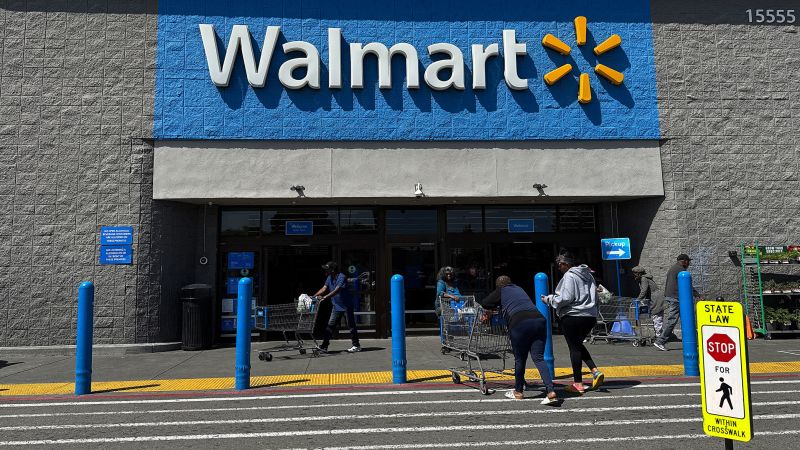New York
CNN
—
Walmart, the world’s largest retailer, warned that is not immune from President Donald Trump’s tariffs. It plans to raise prices on some items as Trump’s global trade war sends the company’s costs higher.
“We will do our best to keep our prices as low as possible but given the magnitude of the tariffs, even at the reduced levels announced this week, we aren’t able to absorb all the pressure given the reality of narrow retail margins,” Walmart CEO Doug McMillon will tell analysts Thursday on an earnings call. Walmart sent out several prepared remarks from executives before the call.
Walmart said the price hikes will begin later this month.
“I’m concerned that consumer is going to start seeing higher prices. You’ll begin to see that, likely towards the tail end of this month, and then certainly much more in June,” Walmart finance chief John David Rainey said in an interview with CNBC Thursday.
Many companies have been raising prices to mitigate cost increases from the 10% universal tariffs on every product entering the United States and higher levies on Chinese goods. Washington and Beijing reached an agreement to lower those tariffs this week, but the United States still charges a 30% levy on most goods coming from China.
Tariffs have already made mattresses, toys, strollers and other products more expensive.
The Federal Reserve said last week that tariffs have led to a 0.3% increase in prices this year. Some companies are increasing the prices of all of their products. Others are hiking targeted items in their catalogs. Many are just eliminating the products that will cause sticker shock rather than try to sell at prices either customers won’t buy or competitors will undercut, companies and analysts say.
Price hikes could put Walmart in an uncomfortable position with Trump. Companies typically communicate why they need to raise prices, but Trump has made doing so a political risk.
The White House took aggressive aim at Amazon last month after the company considered displaying the added cost of tariffs on some items. Trump placed a call to Amazon founder Jeff Bezos about the site’s plans, and White House Press Secretary Karoline Leavitt called Amazon’s plans a “hostile and political act,” while holding up a picture of Bezos in front of news cameras. Trump also threatened Mattel last week after the toymaker said it planned to raise prices because of tariffs, saying in the Oval Office that he might levy a 100% tariff on the company’s toys and suggested the company should remove its CEO.
Walmart’s business in the United States remains strong, despite tariffs and recession fears.
Sales at stores open for at least a year grew 4.5% last quarter, driven by its grocery business. Walmart said it gained with higher-income households last quarter.
Walmart’s (WMT) stock jumped 2% during pre-market trading.
Walmart’s investments have helped it gain more upper-income shoppers in recent years. Historically, Walmart’s primary customers have been lower and middle-income Americans.
Although Walmart is a legacy brick-and-mortar retailer, it has been one of the strongest retailers in America for several years. It successfully navigated the shift to online shopping and built a competitive online business to rival Amazon’s.
Analysts say the company can use its scale and wide supplier base to keep prices down for customers, even as tariffs raise its costs. This could help Walmart gain market share against competitors in the coming months.
Walmart is “well positioned to manage tariffs” given its deep relationships with suppliers, low prices and other strengths, Bank of America analyst Robert Ohmes said in a note to clients this week. The company sells fewer products from China – around 15% of its overall items – than most retailers, so tariffs hurt it less than other businesses.
Around 60% of Walmart’s products are groceries, the vast majority of which are sourced domestically.
Tariffs have presented an enormous challenge for the retail industry.
Most toys, baby gear, sneakers and many other everyday products are made in China, and companies have been rushing to shift production. Companies are raising prices on consumers, cutting products and taking other steps to minimize the impact of tariffs.
Last month, the CEOs of Walmart, Target and Home Depot met with Trump to discuss the impact of tariffs.
Walmart CEO McMillon, who has developed a cordial relationship with Trump through meetings at Mar-a-Lago and several mutual friends, bluntly told Trump that the trade war with China had already started to disrupt the supply chain, officials said, and would only intensify by summer, CNN previously reported.
Walmart said Thursday that trade uncertainty makes it difficult to plan for the future.
“The lack of clarity that exists in today’s dynamic operating environment makes the very near-term exceedingly difficult to forecast.”

